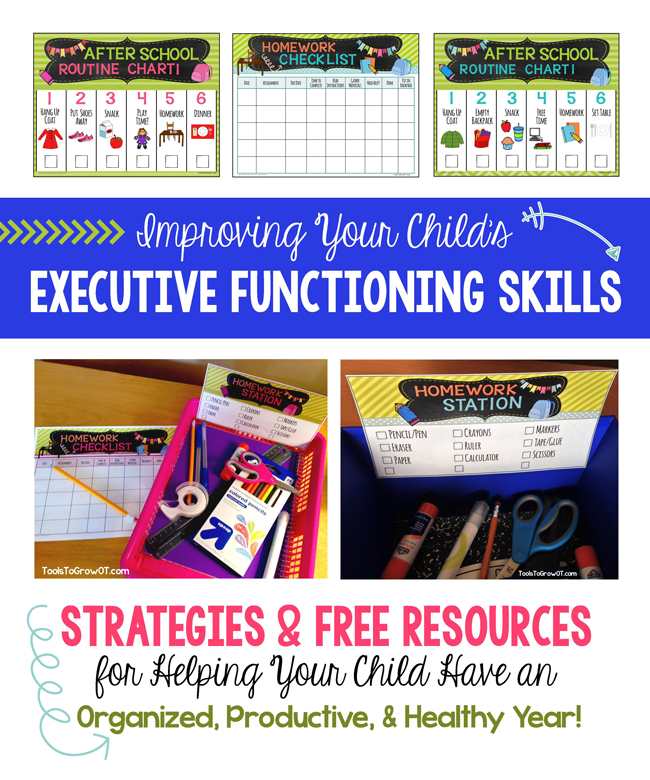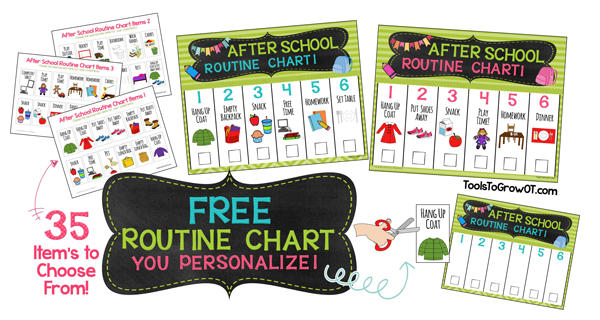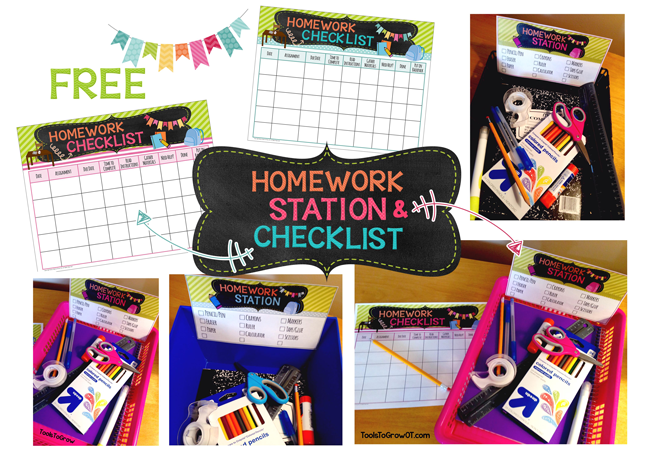Improving Your Child's Executive Functioning Skills at Home
01.31.2015
EXECUTIVE FUNCTIONS … WHAT ARE THEY?
This is a term used to describe the many tasks our brains perform that are necessary to think, act, and solve problems. The term executive skills come from the field of neuroscience. It refers to brain-based skills necessary for humans to execute, or perform tasks. Executive functioning includes tasks that help us learn new information, remember and retrieve information we've learned in the past, and use this information to solve problems of everyday life. A child's executive functioning skills make it possible for him or her to function in a manner consistent for their age. Poor executive functioning may have a significant impact on a child’s success at home, school, and in the community. By late adolescence a child must function with a reasonable amount of independence; he or she should no longer rely on their parents to organize their day, prompt them to start tasks, and manage all of their belongings.

Description of Executive Functions:
Response Inhibition: This is the ability to stop, think, plan, and then act; things that help us control ourselves. An example for a young child would be the ability to briefly refrain from interrupting his parent while on the phone. For an older child an example would be accepting his parent’s directive to come home early without an argument.
Working Memory: This refers to your child’s ability to remember things for immediate use. It is the ability to hold information in one’s memory while performing complex tasks. Working memory incorporates the ability to draw on past learning and experiences. A young child with effective working memory can follow 1-2 step directions to remember what to do during a board game when it is their turn. An adolescent can recall the expectations of both parents and several teachers.
Emotional Control: The ability to modulate and manage an emotional response; school age children need to compromise, share, and accept losing. A young child should be able to take turns during a simple game. An older child should be able to manage the disappointment of losing a soccer game.
Sustained Attention: This refers to your child’s ability to continuously pay attention to a task or activity. Young children should be able to place books on a shelf and toys in a basket for about 5 minutes. An older child can complete one hour of homework with brief breaks.
Initiating Activity: This is the ability to begin a task or project without undue procrastination in a timely manner. A young child should be able to start a chore right after the parent makes such a request. An older child should not wait to the last minute to start a project such as reading a book and completing the corresponding book report.
Planning & Prioritizing: Managing current or future tasks by setting goals and establishing the steps needed to complete the task. This requires that a child prioritize which tasks should be done immediately or which can wait. It also requires that a child learn to sequence or determine which order to complete tasks. A younger child should do their 10 minute homework assignment before playing outdoors. An older child, for example, should be able to identify the steps and execute a plan to get an after school job.
Organization: This is the ability to create and maintain systems to keep track of information and materials. A young child can independently hang his/her jacket on a hook. An adolescent can organize his/her sports equipment and clothing drawers.
Time Management: The ability to prioritize the steps needed to complete and schedule tasks with adequate timing to complete the work satisfactorily. A student needs to know how to estimate time needed to complete tasks and use time wisely.
Goal Directed Persistence: This is the capacity to have a goal and follow through to achieve it. Older children can save money from their job. Younger children can sit through a meal to get dessert.
Flexibility: This is the ability to adapt to new situations and conditions. The child can revise his or her plan despite obstacles, setbacks, or other changing information. Younger children can wait their turn, even when extra people unexpectedly join the game. Older children should be able to adjust to learning that their baseball game was cancelled due to poor weather.
Metacognition: The ability to self monitor and self evaluate so as to determine how one is doing. The child can learn from mistakes. A young child may be able to modify her performance to solve a jigsaw puzzle. A teenager can self monitor and modify her behavior in response to a positive role model.
WHAT IF YOUR CHILD HAS DEFICITS IN EXECUTIVE FUNCTIONING?
The execution of daily routines for the parents of a child with significant deficits in executive functioning can be exhausting. The child may be unable to consolidate his or her behavior into automatic routines or what is known as procedural memory. With such deficits the child may have a poor ability to manage day to day life.
Red Flags: Has Your Child Shown Long Term Issues With The Following?
- Losing and misplacing his belongings
- Needing constant prompting to start chores or homework
- Waiting to the last minute to complete a long term project
- Leaving for school without homework, lunch, jacket, etc.
- Bedroom very disorganized and/or messy
- School notebooks and folders very disorganized
- School locker very messy and disorganized
- Unaware of the passing of time/deadlines
- Needing ongoing prompts to complete all the steps of daily routines such as dressing and bathing
- Forgetting to come home on time
- Breaking rules
- Forgetting to do the task or chore you just asked him/her to complete
- Melting down when others modify expectations or routines
- Over reacting to minor disappointments
This list includes common issues for children with weaknesses in executive skills. Certainly all children will have their own profile of executive functioning strengths and weaknesses. However, if these issues remind you of your own son or daughter, plus he or she is experiencing difficulties at school, it may be highly worthwhile to learn more about executive functioning. While this blog is a brief introduction to the topic, we are happy to offer some general and specific strategies you may wish to implement.
POTENTIAL STRATEGIES
AS THE SAYING GOES … KEEP CALM AND CARRY ON!
When raising a child with difficulties in executive functions, you constantly have to work at it without overwhelming your son or daughter. There is no magic answer that works for all children. Unfortunately, what helped one family may not be suitable for your situation. Consequently, you may need to systematically utilize trial and error to determine which strategies work. In the best scenario your child will intuitively adopt the use of some of these proposed ideas, tools, and strategies.
General Principles For Improving Your Child's Executive Functioning Skills:
- Teach the skills- do not assume that your child will learn these skills on their own. Break tasks down into small steps and practice. You may say “Put these dirty clothes into this laundry basket.”
- Is your child ready?- consider your child’s developmental level. For example, do not expect a six year old to perform a 20 minute chore.
- Set the stage- change your child’s environment and use visual reminders when possible. Ongoing verbal cues may sound like nagging.
- Establish routines and schedules- be prepared to modify and adjust the routine. Engage your child in the brainstorming process regarding how to improve the plan.
- Reward success- provide praise and positive feedback. Seek advice from your child regarding preferred rewards.
- Withdraw support slowly- it may take time.
DID YOU HAVE A NICE DAY?
So as to ease your child’s transition from school to home, Tools to Grow, Inc. is pleased to offer parents and caregivers these free ideas and downloadable resources. Use these “tools” when coaching your child to stay organized and productive after school.

AFTER SCHOOL ROUTINE CHART:
Executive Functions Addressed: Organization, goal directed persistence, and metacognition.
- Keep expectations consistent- put belongings in the same place each day and follow the same schedule.
- Use visual reminders- these FREE downloadable pictures are designed to increase your child’s independence for completing sequenced tasks and keeping belongings where they belong.
You can find additional daily Routine Charts here!
HOMEWORK PLANNER & CHECKLIST:
Executive Functions Addressed: Planning, time management, task initiation, sustained attention, goal directed persistence, and metacognition.
- Each day after school your child can use this FREE downloadable checklist to record and monitor his/her homework plan.
- Record all assignments- this helps to ensure that he/she has all the needed materials.
- Your child will learn to predict the time required to complete each task and if he/she will need your help to complete their homework.

HOME WORK STATION:
Executive Functions Addressed: Sustaining your child’s attention, initiating the chore of doing homework, and optimizing organization.
- Regardless of where live and how you arrange your home, most children respond favorably to structure and routine. Arrange a designated area in your house for your child to complete after school work.
- Lighting- provide bright natural, overhead lighting or lamps.
- Minimize distractions- from television, phone.
- Comfortable posture- if using a table and chair aim for ideal posture with feet supported and writing surface at elbow height. Some children are more productive when standing or on their belly; allow the choice.
- Build in breaks- if it is a prolonged assignment or project
- Supplies- Use this FREE downloadable label/checklist to keep supplies and materials well stocked at your child’s fingertips at their home work station. A simple bin from the dollar store may be all that is needed!
You can find these FREE Executive Functioning and Home Routine Resources here. We hope these strategies and tools help your child to stay organized and productive after school.
This blog is part of a series by The Inspired Treehouse called HAPPY NEW YEAR, HEALTHY KIDS! A series where 20 child development bloggers from several different professions weigh in with their best tips for raising happy, healthy kids! To read all the topics included in the Happy New Year, Healthy Kids series, CLICK HERE!

References:
Dawson, P. & Guare R. (2010). Executive Skills in Children and Adolescents. New York: The Guilford Press
Dawson, P. & Guare R. (2009). Smart but Scattered. New York: The Guilford Press
Van Gemert, L. (2014), The EF Gap. Mensa Bulletin Issue 577. Arlington Texas
Related Topics: Executive Functioning Skills, Free Resources , Self-Help/Life Skills, Therapy Blog Hop , Tools to Grow at Home


